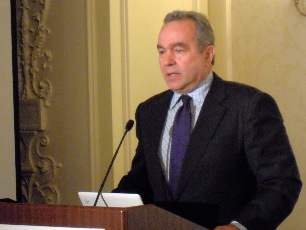 The 20th General Meeting of the Pacific Economic Cooperation Council was held in Washington D.C. on September 29, 2011. The gathering of policy experts from business, government and the academia met under the theme of the "State of the Region". The meeting tackled critical issues to spurring sustainable growth including: how to make it easier to trade services which now are the largest part of most of the region's economies; how to make growth more inclusive to ensure no segments of society get left behind; and how to make progress on the TransPacific Partnership.
The 20th General Meeting of the Pacific Economic Cooperation Council was held in Washington D.C. on September 29, 2011. The gathering of policy experts from business, government and the academia met under the theme of the "State of the Region". The meeting tackled critical issues to spurring sustainable growth including: how to make it easier to trade services which now are the largest part of most of the region's economies; how to make growth more inclusive to ensure no segments of society get left behind; and how to make progress on the TransPacific Partnership.
Also addressed in the meeting were some of the underlying structural issues in the Asia-Pacific economy: the risk of long-term unemployment and policy frameworks to create jobs; energy security issues; and the fundamental changes that have taken place in the trading system since the launch of the WTO Doha Round.
The meeting opened with a discussion on the latest economic forecasts from the International Monetary Fund (IMF) and the results of the annual State of the Region report issued by the PECC. Despite the gloomy outlook and rising pessimism, there is an opportunity over the coming 6 weeks for leaders to take concrete actions to restore confidence to global markets and the international system at the G20 summit in Cannes, the APEC leaders' meeting in Honolulu and the East Asia Summit (EAS) in Bali.
According to the annual survey conducted by the Pacific Economic Cooperation Council (PECC), 80% of the respondents, made up of about 430 opinion-leaders from the government, business, academia, and the media, expect slower growth in the next 12 months in the United States and the same for the European Union. The same survey placed investment in new tecnhologies and innovation systems as the top policy priority for achieving sustainable growth in the region.
While structural reforms and rebalancing must continue, the participants gathered at the 20th General Meeting of PECC agreed that the Pacific economies must invest in new technologies and innovation systems while actively looking for ways to enhance cooperation in areas such as the services trade, energy, and green growth. As the core of the global economic shifts to the Pacific Basin the world is looking increasing to the region for leadership. The report highlights APEC's ongoing agenda for economic integration and support for the global multilateral system as critical to the process of restoring confidence. Progress in these areas will send a strong signal to the business community that protectionism will not close off markets to their goods and services. Efforts to make the regulatory environment easier to navigate and less burdensome, especially for small and medium enterprises, need to bear fruit. Under Secretary of Commerce for International Trade, Francisco J. Sanchez highlighted how few small and medium enterprises are engaged in global trade so making it easier for them to do business across borders would open a huge new market for their products and services across the world. PECC' s survey findings show “behind-the-border” problems like regulatory impediments the most burdensome.
A special paper commissioned by PECC highlighted, however, that there was significant potential for transpacific energy trade and job creation in the energy sector with the recent discovery of shale gas deposits in the United States. Such developments would help ease the trade deficit problem with Asia for the US while it could also help Asian economies diversify their sources of supply and therefore improve energy security for the region as a whole.
Assistant Secretary of State for East Asian and Pacific Affairs, Kurt Campbell underscored the importance of continued strategic alliance with the Asian economies and reaffirmed the US’s commitment to the region at the opening address.
Youth delegates urged PECC to play a more active role in reaching out to the general public with the aim of bridging the information divide between the policy-makers and public about the many multilateral frameworks and institutions such as the Asia-Pacific Economic Cooperation (APEC), G20, and East Asia Summit (EAS). This is the fifth time that PECC invite a group of selected youth delegates from various economies to participate and interact with the members of PECC and other eminent individuals from the government, academia and the business community.
The 20th General Meeting of PECC was hosted by USAPC in Washington D.C. and was held back-to-back with the Standing Committee meeting of PECC (28 and 30 September 2011).
Program agenda with papers and presentations
Speakers' profile (59KB, pdf)
Three concurrent sessions at the General Meeting:
Session 1: Enabling 21st Century Services in the Asia-Pacific
Session 2: The Trans-Pacific Partnership (TPP): Views from the Inside and the Outside
Session 3: Paths to Inclusive Growth
Media reports related to the 20th General Meeting